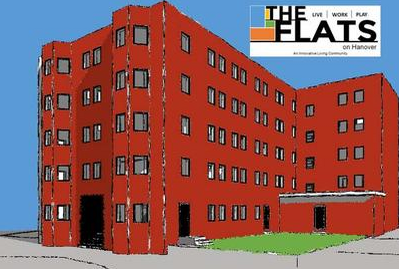
MANCHESTER, NH – Is Manchester ready to take a giant step into the future of urban life with micro-apartments that would target millennials?
That’s the question posed by Elm Grove Companies, a Manchester real estate development company which has started work on a planned community of micro apartments, to be located at 235 Hanover Street, the former site of The Farnum Center.
The Flats @ Hanover Commons will connect Bronstein Park (formerly Hanover Commons) to Elm Street and “spur re-gentrification by attracting a tenant base focused on walk-ability, amenities and living efficiency.”

As planned, The Flats @ Hanover Commons will be a mixed-use development with 32 rental units, ground level office spaces and a cafe with courtyard. 24 of the 32 apartments will be micro-units, small spaces around 300-400 square feet, focused on quality workmanship, featuring built-in and dual purpose features, such as pull out beds, and space maximization.
Amenities will include a gym, community lounge, shared courtyard, common area wifi, bicycle storage and an elevator, according to the website, which details the concept. The housing is strategically located within an eight-minute walk from more than “1,000 well-paid professionals,” working at places like Dyn, Wedü, AlphaLoft, and several other large companies and law firms.
Currently Elm Grove Properties is looking for feedback through its website to make sure they “get it right” as they finalize details. They have created a brief survey for potential tenants, which should take about five minutes.

If a micro-apartment complex succeeds here it may help solve one of the city’s biggest challenges: attracting and maintaining a young, educated workforce, needed to help companies of the future grow their workforce and potentially shift the focus of the downtown, toward a more walkable, upscale culture.
Micro-housing has the potential to reshape the city in much the same way as workforce housing at the turn of the last century made it possible for mill workers to live and work in Manchester.
It’s not without hurdles, for both developers and tenants, the most pressing being: If they build it, will tenants come?
That’s an essential question, says James Vayo, of Nashua, project manager for Renaissance Downtowns, a New York-based development company.
“That’s an essential question and a necessary one to ask – and attempt to answer. Consider the question a premise to an experiment, a social experiment, even if it fails to produce the expected results,” says Vayo, noting that this type of unit has been done with great success regionally, specifically in Providence, RI.
“It will still have been an attempt to try something new in a place that, without any change in the current trajectory, has been serving the city poorly for sometime. New efforts, new capital, are the market disruption needed to vet out if this area is ready for a major market shift and revitalization,” says Vayo. “If it is – and I believe it is, given the shifting demographics in our country – then all the social ills which are characteristics of the area will subside and the new mix of people will aim to resolve local challenges.”
Vayo also said none of that can happen without high-quality affordable housing for people who are choosing to live a walkable urban lifestyle.
He said for him it’s less about “gentrification,” a term that can be divisive, and more about “softening the concentration of poverty.”
“For me, it’s about reintroducing currently segregated wealth back into our cities. Anytime you can create an environment with a mix of all types of people and all levels of income, then the result is going to be a more vibrant city and eventually a more cohesive social condition,” Vayo said.
While micro-living may not be ideal for everyone, it isn’t meant to be. It’s a concept currently trending elsewhere in other major cities, and coincides with the “tiny house” movement, which has grown and captivated many via exposure through social media.
Click here to learn more about The Flats @ Hanover Commons. Click here to take the survey.
You’re one click away! Sign up for our free eNewsletter and never miss another thing








